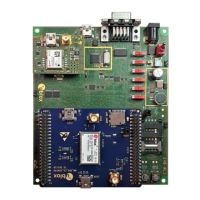SARA-R5 series - System integration manual
UBX-19041356 - R04 System description Page 30 of 118
C1-Public
• Variants 2, 3 and 4, consisting in two UART interfaces (first primary UART on RXD, TXD, CTS, RTS
pins, and second auxiliary UART on DCD, DTR, RI, DSR pins) plus ring indication and DTR functions:
o First primary UART interface supports:
▪ AT commands
▪ data communication
▪ multiplexer protocol functionality (see 1.9.1.4)
▪ FW update by means of FOAT
▪ FW update by means of the u-blox EasyFlash tool (see the firmware update application
note [21])
The following lines are provided:
▪ data lines (RXD as output, TXD as input)
▪ hardware flow control lines (CTS as output, RTS as input)
o Second auxiliary UART interface supports:
▪ AT commands (variant 2 only)
▪ data communication (variant 2 only)
▪ FW update by means of FOAT (variant 2 only)
▪ diagnostic trace log (variant 3 only)
▪ GNSS tunneling (variant 4 only)
The following lines are provided:
▪ data lines (DCD as data output, DTR as data input)
▪ hardware flow control lines (RI as flow control output, DSR as flow control input)
o Ring indication function over the GPIO pin configured for this purpose (see section 1.11)
o DTR function, to control low power idle mode in case of +UPSV: 3 setting, over the GPIO pin
configured for this purpose (see section 1.11)
☞ When +USIO variant 4 is set, second auxiliary UART interface does not support flow control and
status of its CTS line (RI pin) can be ignored.
UART general features, valid for all variants, are:
• Serial port with RS-232 functionality conforming to the ITU-T V.24 recommendation [5], with
CMOS compatible levels (0 V for low data bit or ON state, and 1.8 V for high data bit or OFF state)
• Hardware flow control (default value) or none flow control are supported
• UART power saving indication available on the hardware flow control output, if hardware flow
control is enabled: the line is driven to the OFF state when the module is not prepared to accept
data by the UART interface
• One-shot autobauding is supported and it is enabled by default: automatic baud rate detection is
performed only once, at module start up. After the detection, the module works at the fixed baud
rate (the detected one) and the baud rate can be changed via AT command
• The default frame format is 8N1 (8 data bits, no parity, 1 stop bit)
SARA-R5 series modules are designed to operate as cellular modems, i.e. as the data
circuit-terminating equipment (DCE) according to the ITU-T V.24 recommendation [5]. A host
application processor connected to the module UART interface represents the data terminal
equipment (DTE).
☞ UART signal names of the cellular modules conform to the ITU-T V.24 recommendation [5]:
e.g. TXD line represents data transmitted by the DTE (host processor output) and received by the
DCE (module input).

